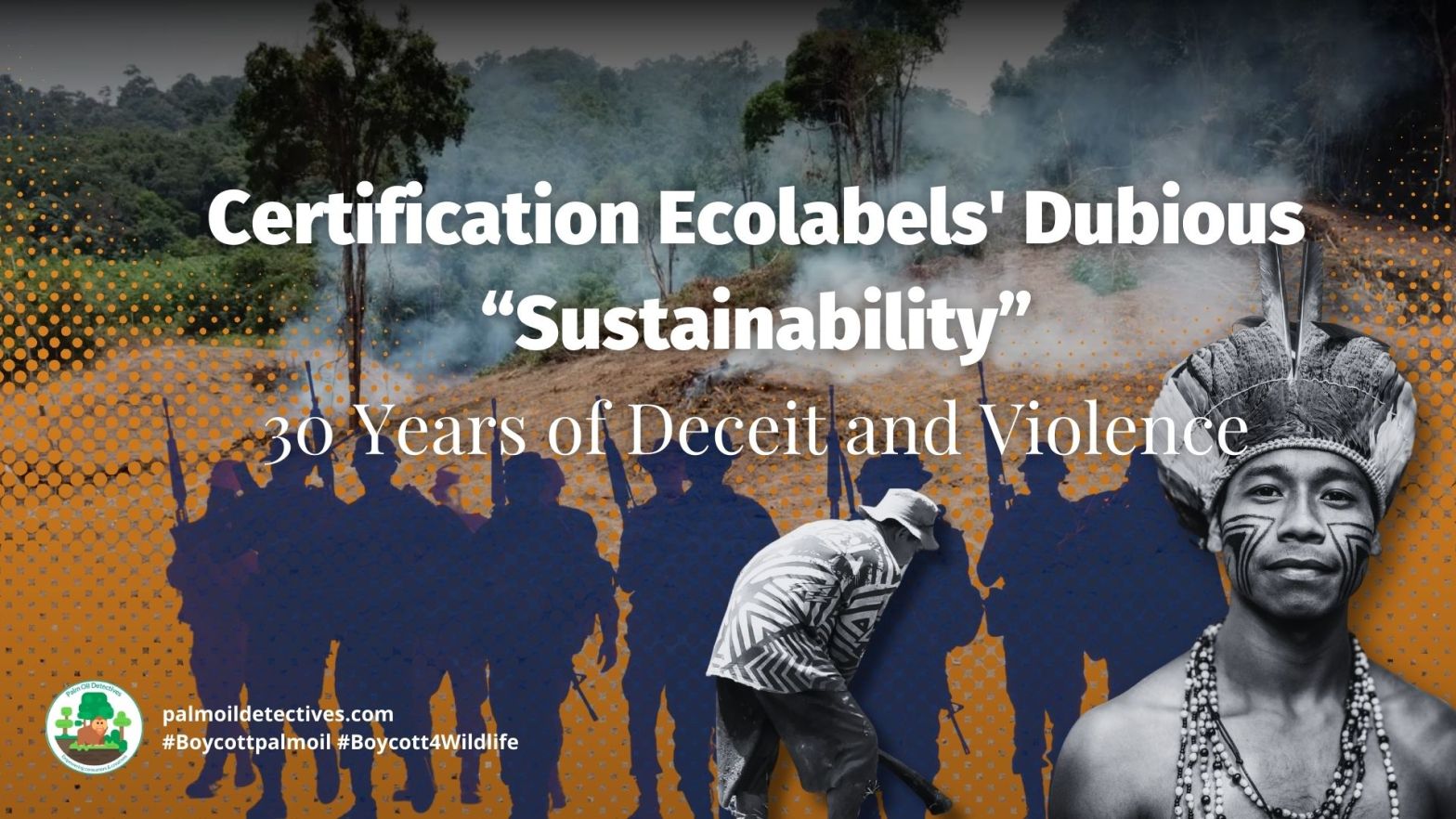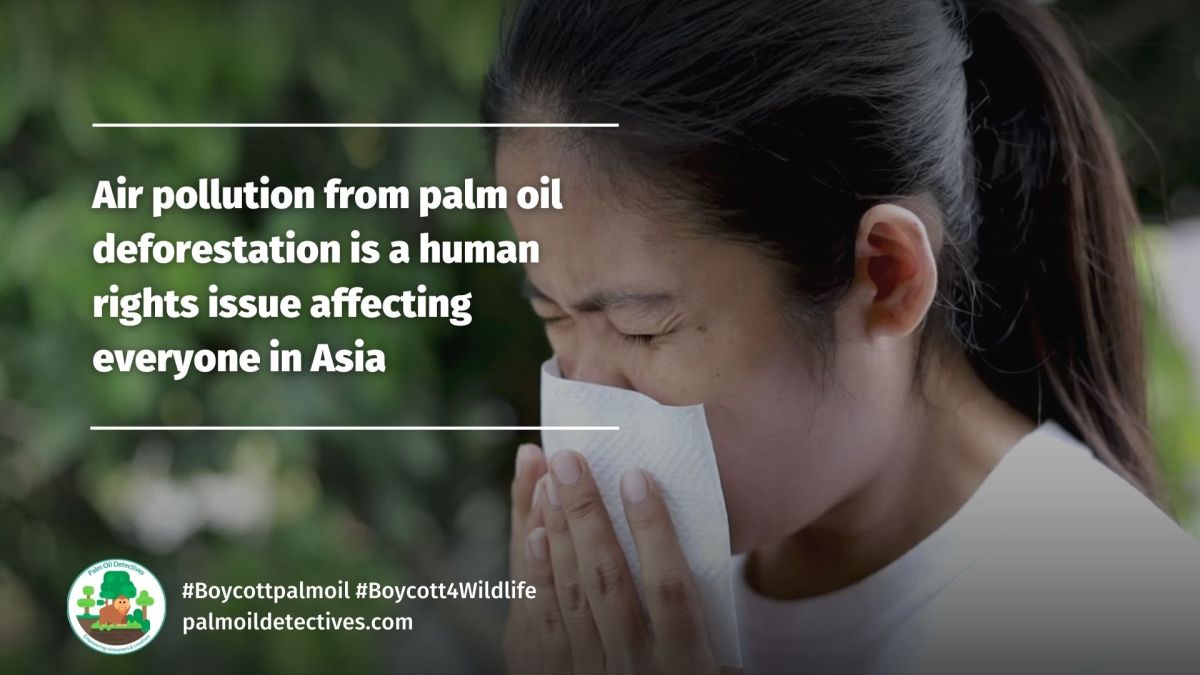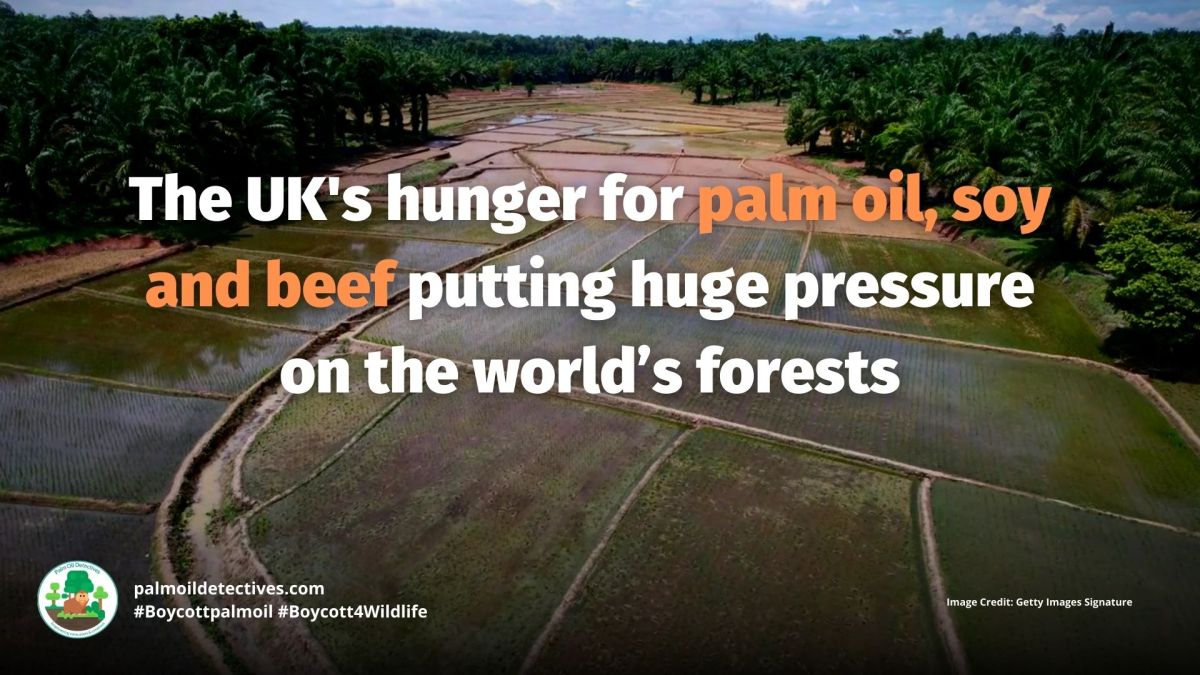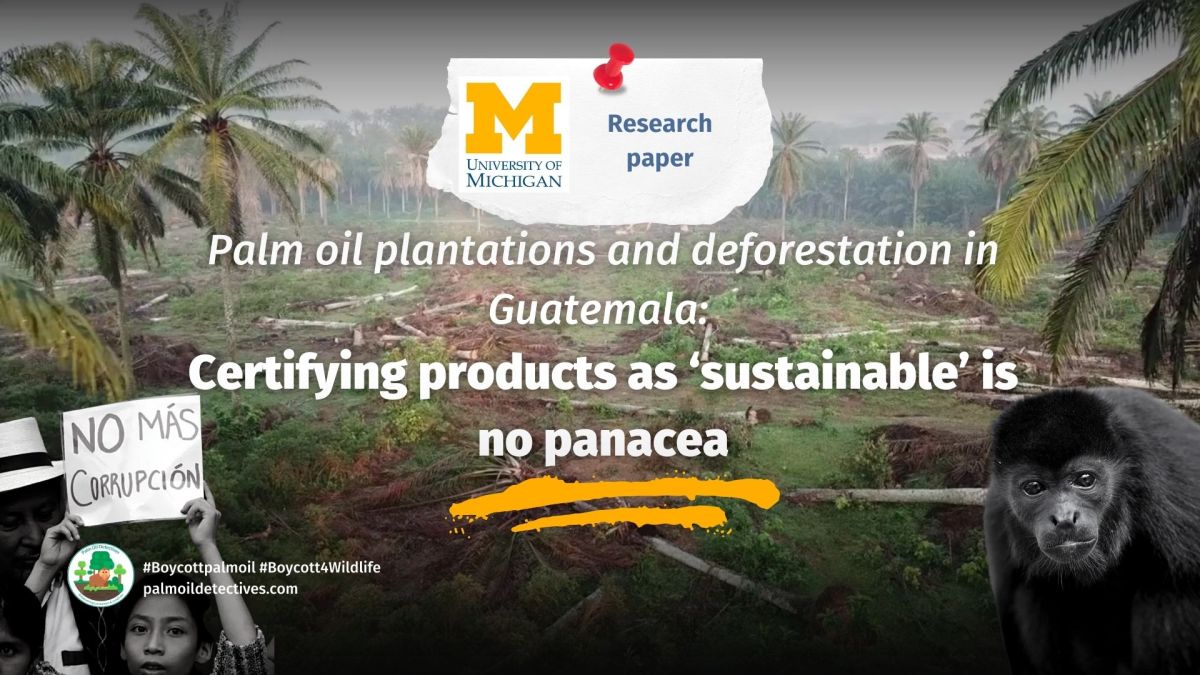Ecolabels like RSPO and FSC are involved in networks of extensive greenwashing. They exist to conceal corporations’ environmental damage rather than fighting it. With three decades dubious promises from environmental certifications, World Rainforest Movement calls for a swift end to this disgraceful palm oil, soy and timber industry greenwashing. You can help resist palm oil colonialism and ecocide #Boycottpalmoil #Boycott4Wildlife every time you shop!
#Ecolabels like #RSPO and #FSC are accused of greenwashing, hiding corporations’ environmental damage from consumers, rather than fighting against this #corruption. Fight back with your wallet and #Boycottpalmoil #Boycott4Wildlife
Tweet
World Rainforest Movement and Palm Oil Detectives call for an end to #palm oil #greenwashing from #RSPO “sustainable” palm oil. Resist the greenwash and #Boycottpalmoil #Boycott4Wildlife in the supermarket!
Tweet
This article was originally published by World Rainforest Movement as “Certification schemes on “sustainability”: 30 years of deceit and violence” on 25 March, 2023 and was republished with permission here alongside other reports from World Health Organisation, Global Witness and others. Read original.
The shelves in supermarkets and stores are full of certified products. The packaging displays different labels indicating products were made with “sustainable” paper or wood, food or cosmetic products made with “sustainable” palm oil, “responsible” soybeans and so on and so forth.
Even when it comes to buying an airplane ticket, consumers can pay a little more
to ensure that their carbon emissions are (supposedly) “neutralised”, so as to guarantee that much touted “sustainability”.

Read more: WHO Bulletin Report: Palm Oil and Human Health Impacts
So why is there this need for so many labels and forms of certification? What is actually being certified? And who is benefiting from this?
After 30 years of certification schemes with environmental and social bias, what is clear is that the only “sustainability” that they guarantee is that of corporations’ lucrative business.
The first environmental certification mechanism for a specific product (wood) and its production chain emerged in the early 1990s, with the creation of the Forest Stewardship Council (FSC). Although its origin is connected with civil society pressure on corporations, FSC has been fully incorporated into the production logic of logging companies operating in forests, of giant paper and pulp corporations using tree monoculture plantations, as well as of producers and distributors of consumer goods.
Over time, having shown that it did not constitute any threat – on the contrary: an opportunity – to the accumulation strategy of the corporations involved, other sectors started creating similar mechanisms. Hence, starting in the 2000s, initiatives and so-called roundtables for “sustainable” or “responsible” production of palm oil, soybeans, cocoa, sugarcane, among others, proliferated.
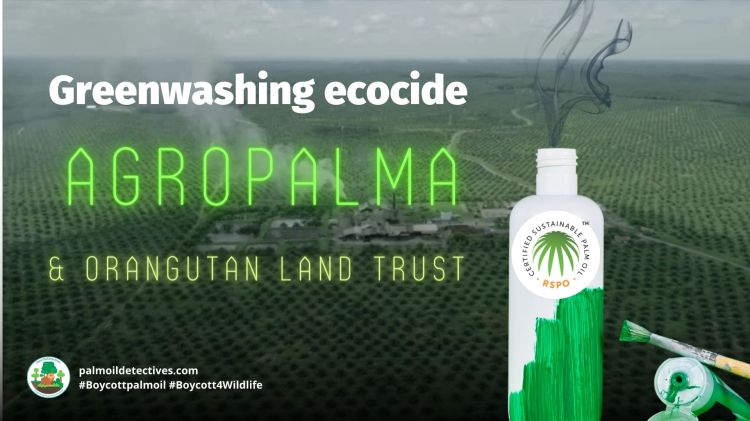
Read more: Greenwashing Ecocide: Agropalma and Orangutan Land Trust
100 NGOS signed a public statement denouncing the RSPO in late 2022
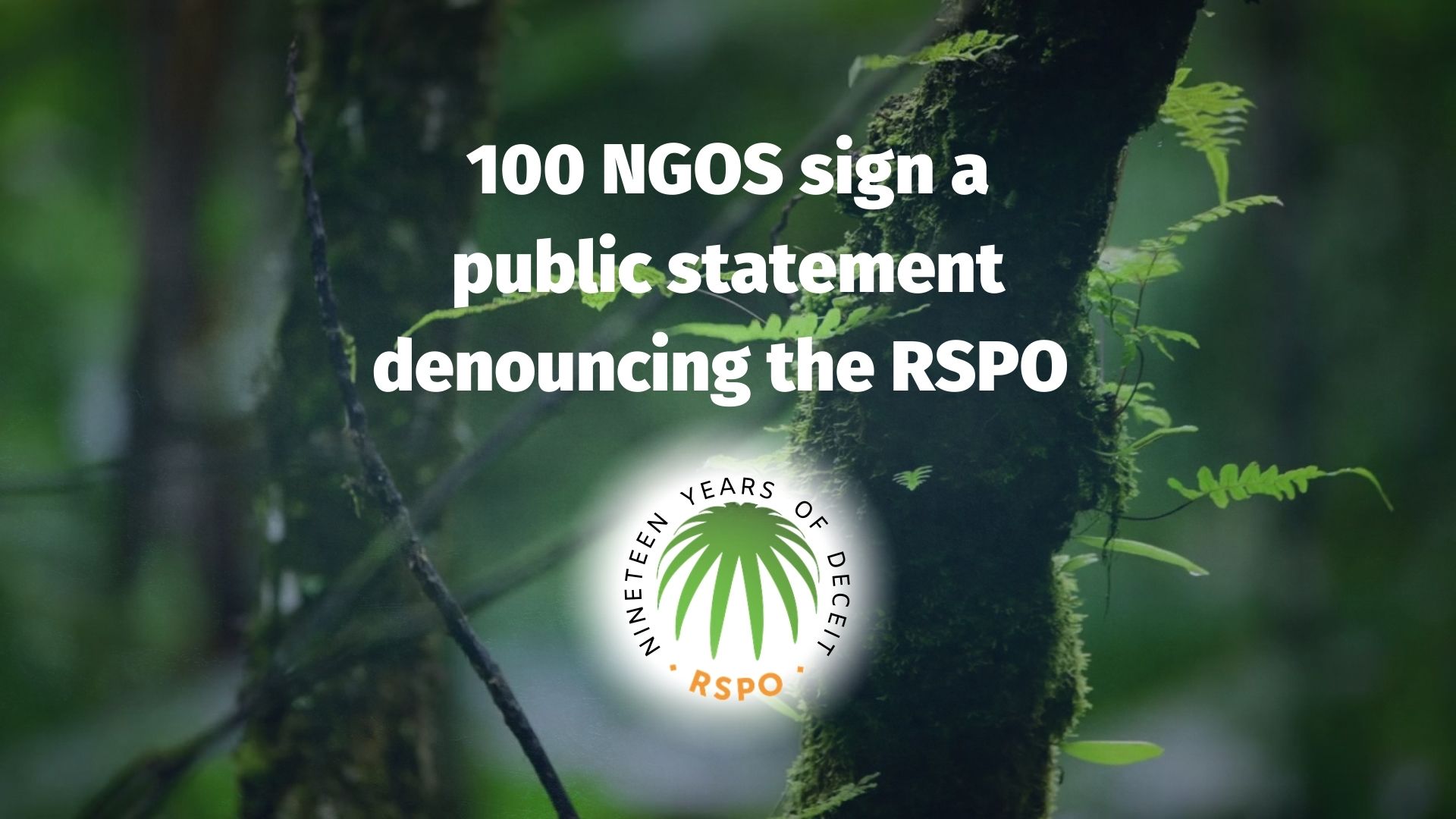



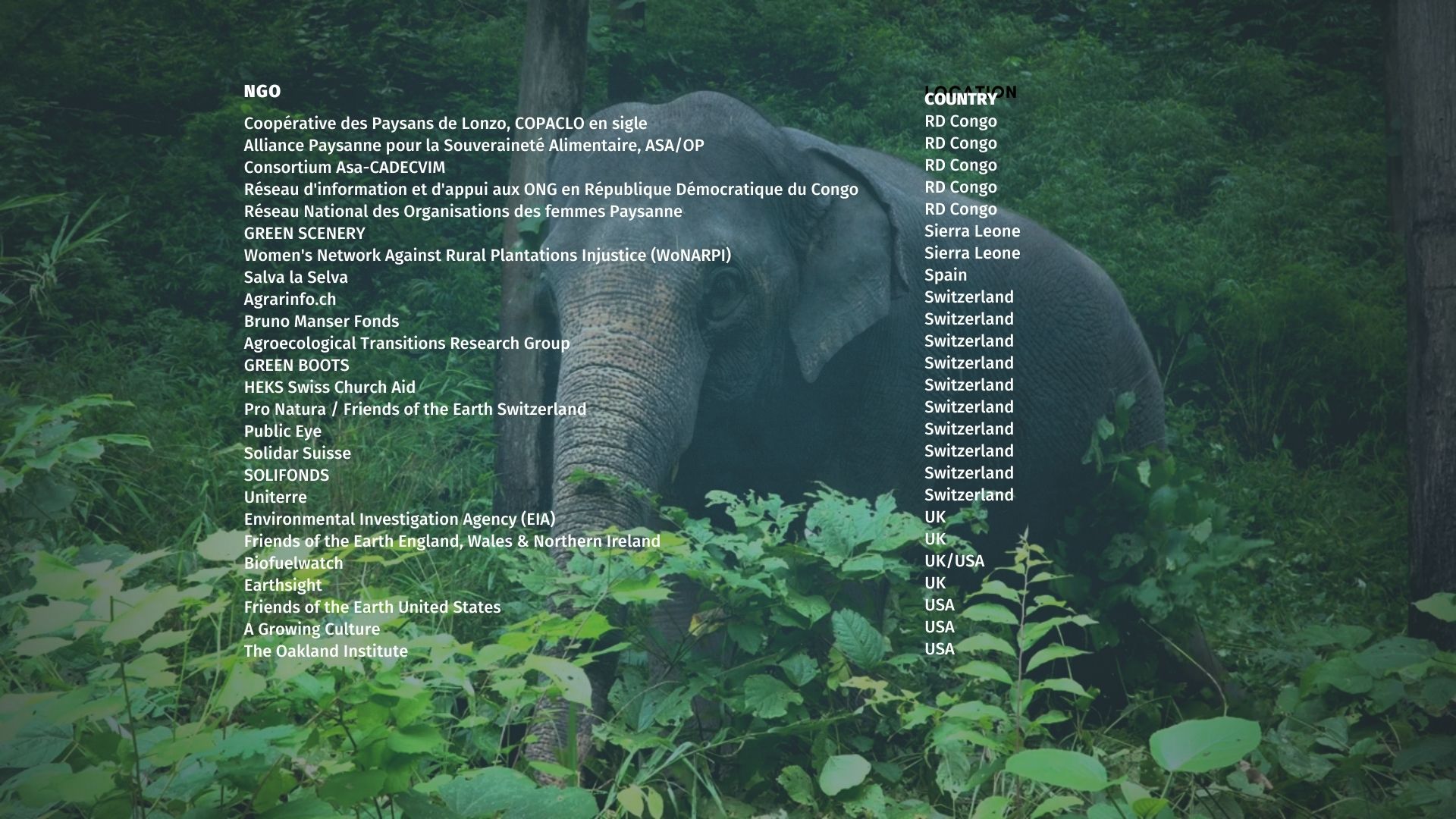
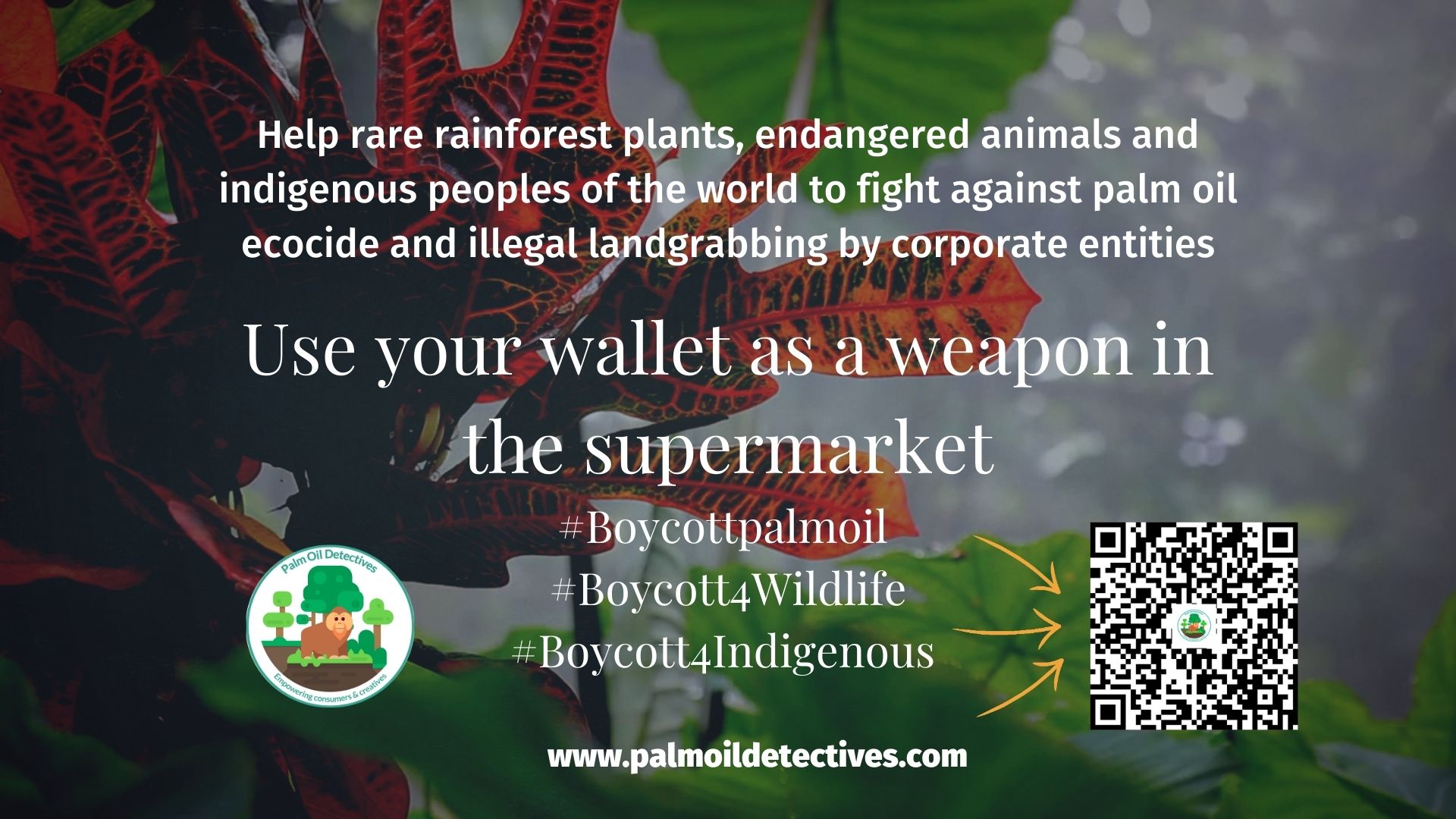
These “sustainable” initiatives have various aspects in common
1. They are dominated, compromised and funded by corporate interests
They are schemes that present themselves as non-profit associations including many apparently diverse actors and interests (companies, NGOs, governments etc.) However, in practice, the business sector participants andtheir allies, like the big conservationist NGOs, dominate these initiatives and impose their interests in a highly unequal power relation between the members.
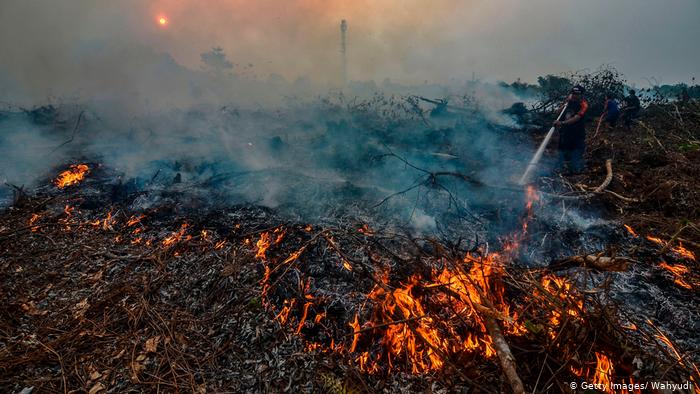
2. They promote toothless and unenforceable guidelines
They are mechanisms that establish operational guidelines and directives for companies to adhere to on a voluntary bases, leaving no possibility of legal consequences when rules are broken – rules formulated and judged by the companies themselves, it should be noted.
3. They promote an endless growth model of capitalism in spite of our limited and finite natural world
They are initiatives submitted to the logic of the market and its expansion, that is to say, certification labels have become important both to obtain funding for companies’ expansion projects and to win over consumers, mainly urban consumers and those from the global North. Read more about the limits of the Endless growth model.
4. The mechanism for conflict resolution is set and decided upon by the certification label itself – amplifying racial and gender inequities
They are mechanisms headquartered in countries of the North, and with management boards mainly composed of men and white people, leaving the rural communities of the South that have to face the certified plantations, to play the role of mere receivers of determinations imposed from outside about the use of the space where they live. And if they want to question the actions of any of the certified companies, they must submit to the protocol created by the certification system itself on how to proceed.
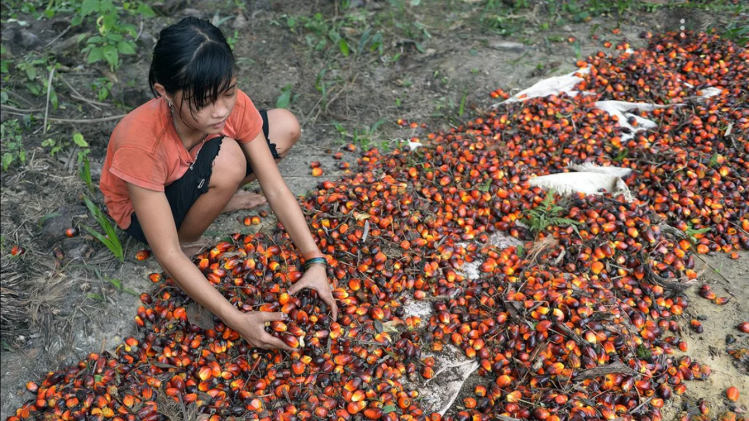
5. They use greenwashing language and false promises even though this does not reflect reality
Certification schemes are used by companies as defence mechanisms whenever they are faced with criticism over the impacts of their activities:
“Our products are certified…”, “The project has certification…”, as if this has guaranteed that there is no cause for concern.
One way or another, such certification mechanisms have not stopped the destructive expansion of industrial tree plantations, oil palms, soy, etc. Read more about using Design and Words as a greenwashing tool.
6. The predatory nature of corporate land-grabbing and expansionism cannot ever work in favour of indigenous peoples
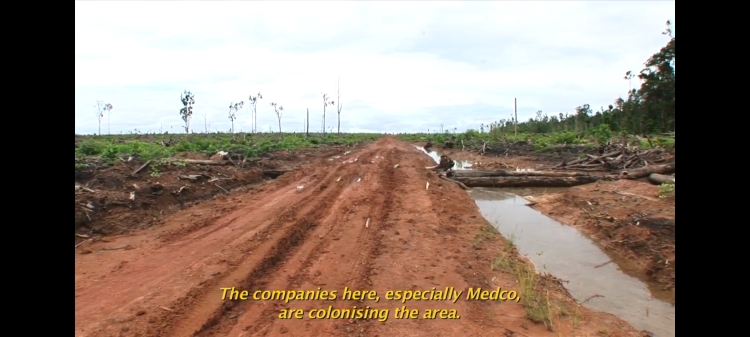
Certification labels have not been able to resolve the conflicts generated with traditional communities and Indigenous Peoples. Nor do they have the potential to do so, since they are designed to allow the continuity and expansion of corporate accumulation patterns that are intrinsically dependent on a predatory dynamic.
In fact, the main common denominator of such certification schemes is that they guarantee a green label to the companies involved, thus contributing to their primary objective, i.e., the maximisation of profit.
7. Certification labels like FSC and RSPO are vital to for companies gain consumer buy-in and greenwash away harms
Certifiers have hence become a key element through which companies seek to legitimize their territorial and economic expansion in the global South, deceiving consumers with the “sustainability” discourse.
In other words, these destructive corporations need certification labels to obtain some legitimacy in the eyes of consumers and investors, bearing in mind the vast number of reports, news and studies showing their harmful effects, such as:
- Violent corporate land-grabbing aided by private enforcement or military/police intervention
- Problematic, deceptive or non-existent community consultation processes
- Contamination by agro-chemicals and its human health and environmental impacts
- Soil degradation
- Dangerous and humiliating jobs
- Sexual abuse and other forms of violence against women
- Child slavery and indentured slavery
among many other impacts related to extensive monoculture plantations.
This permits one to affirm without reservation that certification itself has become an underlying cause of deforestation.
10 Tactics of Sustainable Palm Oil Greenwashing
Greenwashing Tactic #1: Hidden Trade Off
When a brand makes token changes while continuing with deforestation, ecocide or human rights abuses in another part of their business – this is ‘Hidden Trade Off’
For example, Nestle talks up satellite monitoring to stop palm oil deforestation. Yet…
Read moreGreenwashing Tactic #2: No Proof
Claiming a brand or commodity is green without any supporting evidence The RSPO promises to deliver this with their certification: 1. Improves the livelihoods of small holder farmers 2. Stops illegal indigenous land-grabbing and human rights abuses 3. Stops deforestation…
Read moreGreenwashing Tactic #3: Vagueness
Claiming a brand or commodity is ‘green’ or ‘sustainable’ based on broad generalisations, unclear language or vague statements Jump to section Greenwashing: Vagueness in Language Greenwashing: Vagueness in certification standards Reality: Auditing of RSPO a failure Quote: EIA: Who Watches…
Read moreGreenwashing Tactic #4: Fake Labels
Claiming a brand or commodity is green based on unreliable, ineffective endorsements or eco-labels such as the RSPO, Forest Stewardship Council (FSC) or FairTrade coffee and cocoa. Greenwashing: Fake Labels and fake certifications Ecolabels are designed to reassure consumers that…
Read moreGreenwashing Tactic #5: Irrelevance and Deflection
Claiming a brand, commodity or industry is green based on irrelevant information Jump to section Greenwashing: Irrelevant Topics Greenwashing: Colonial Racism Research: Palm oil greenwashing and its link to climate denialism Reality: RSPO Certification Doesn’t Stop Deforestation, Human Rights Abuses…
Read moreGreenwashing Tactic #6: The Lesser of Two Evils
Claiming that a brand, commodity or industry is greener than others in the same category, in order to excuse ecocide, deforestation, human rights and animal rights abuses. Jump to section Greenwashing: Lesser of Two Evils: Palm Oil Uses Less Land…
Read moreGreenwashing Tactic #7: Lying
Telling outright lies over and over again to consumers until they are believed as truth Jump to section Greenwashing: Endangered species Reality: Endangered species Greenwashing: Human rights, land-grabbing and livelihoods for workers Reality: Human rights, land-grabbing and livelihoods for workers…
Read moreGreenwashing Tactic #8: Design & Words
Using design principles and greenwashing language in order to trigger emotional and unconscious responses in consumers Jump to section Greenwashing: Design Principles Greenwashing Design Example: Palm Done Right Greenwashing Design Example: WWF Palm Oil Scorecard 2021 Greenwashing with Words: Vegan…
Read moreGreenwashing Tactic #9: Partnerships, Sponsorships & Research Funding
Jump to section Orangutan Land Trust funded by rainforest destroying palm oil co. Kulim Malaysia Berhad Orangutan Land Trust funded by Agropalma: during decades-long destruction of the Amazon for palm oil Orangutan Land Trust and New Britain Palm Oil (NBPOL):…
Read moreGreenwashing Tactic #10: Gaslighting, Harassment, Stalking and Attempting to Discredit Critics
Attempting to humiliate, gaslight, discredit, harass and stalk any vocal critics of a brand, commodity or industry certification in order to scare individuals into silence and stop them from revealing corruption Greenwashing’s most insidious and darkest form is the attempt…
Read moreTen Tactics of ‘Sustainable’ #PalmOil #Greenwashing
There has never been a more urgent time for consumers to wake up to the devastation wrought by global supermarket brands for palm oil Jump to section 1. Greenwashing with Hidden Trade-Off 2. Greenwashing with No Proof 3. Greenwashing with…
Read moreNew forms of greenwashing: Carbon Credits and Biodiversity Credits
Furthermore, it is important to mention that the idea of certification has been taking on new shapes. With the creation of offset mechanisms for carbon emissions and biodiversity loss, new commodities have emerged already linked to certification mechanisms. In this new market, carbon credits and biodiversity credits – issued by certification schemes – represent a supposed guarantee that greenhouse gas emissions or the destruction of biodiversity are being duly offset elsewhere.
Differently from wood, paper, palm oil or soybeans, where the certification is “added” to the product by means of a label, in the carbon or biodiversity markets it is the
certification itself that makes it feasible for the product to be consumed.
In other words, the commodity in itself is supposedly a guarantee – though a virtual guarantee, obtained through dubious methodologies and permeated by openly suspect interests.
This compilation of articles from the WRM Bulletin aims to underscore the damaging role played by companies and organisations involved in certification schemes. WRM considers it important to highlight that after three decades with ever more environmental certification labels on the market, it is urgent to put an end to this greenwashing.
Ultimately, instead of combating environmental devastation and the social ills linked
to corporations’ and other players’ operations, these labels cover up and
sustain their destructive logic.
Sexual Exploitation and Violence against Women at the Root of the Industrial Plantation Model
The industrial plantation model is intrinsically linked with patriarchal oppression, serving as a cornerstone for corporate profitability. Companies often exploit women, recognizing their integral role within community dynamics, as a means to augment their bottom line. The intersection of gender and economic exploitation exemplifies the profound social implications of this oppressive system.
RSPO: outsourcing environmental regulation to oil palm businesses and industry
The RSPO certification, cleverly turning the palm oil industry’s legitimacy crisis to its favor, uses it as a stepping stone to further strengthen the industry’s position. It provides certificates claiming to meet sustainability standards—a clear advantage to the industry. However, it’s important to note that these standards are largely controlled by and designed to benefit companies operating within the palm oil sector itself.
“Gender” in the palm oil industry and its RSPO label
Implementing gender policies in oil palm companies and the RSPO certification scheme is a start. But do they truly tackle the violence, patriarchy, and racism in the plantation model, or merely mask them? It’s crucial to examine how these policies are enacted and if they genuinely drive substantial change, or just scratch the surface of these systemic issues.
Colombia: Palm-Producing Company Poligrow Plans to Grab more Land under the “Small Producers” Scheme
The harsh realities of violence, mass killings, and forced relocations amid the armed conflict in Colombia have disturbingly paved the way for the expansion of industrial oil palm cultivation. The palm oil company and RSPO member Poligrow, has been significantly implicated in these issues, with credible allegations of land seizure and intimidation tactics within the region of Mapiripán.
Greenwashing Words: Language that kills forests
Language never operates in a vacuum. Historically, specific terms have been leveraged as tools for exercising control over populations and territories. This article throws light on certain terms which, while seemingly positive, often shield economic interests detrimental to forests, forest animals and forest peoples.
Africa: The RSPO certification for palm oil plantations is greenwash!
The Roundtable on Sustainable Palm Oil (RSPO) is a widely used certification system promising environmental, safety, and human rights standards in the palm oil industry. However, Friends of the Earth Africa groups contest its effectiveness, citing ongoing environmental degradation, human rights breaches, biodiversity loss, and increased poverty in Africa linked to the activities of palm oil companies.
Communities resisting the impunity and impacts of oil palm growers in Ecuador: Cases from Esmeraldas
The palm industry in Ecuador, encompassing 270,000 hectares of plantations, has been using the Roundtable on Sustainable Palm Oil (RSPO) certification to project an image of sustainability, setting itself apart from Asian palm oil. However, critics argue that this certification merely muffles community objections. Resistance from communities such as La Chiquita, Guadualito, and Barranquilla de San Javier in the Esmeraldas region continues to fuel discontent and foster international solidarity.
RSPO Certification despite land conflicts, violence and criminalisation
Nearly 1,500 members of MALOA in Sierra Leone are challenging RSPO’s certification of a SOCFIN subsidiary. They cite a string of conflicts and grievances tied to land use. This move follows controversial certifications of SOCFIN group’s operations in Nigeria, Cameroon, and Ivory Coast. Critics question if RSPO, perceived as industry-biased, can truly guarantee sustainability and human rights in the palm oil sector.
Are FSC and RSPO accomplices in crime? Agropalma’s Unresolved Land Question in the Brazilian Amazon
The Palmas del Ixcán company in Guatemala is accused of implementing systematic dispossession of land from indigenous communities for oil palm cultivation, using tactics such as deceptive RSPO certification and independent producers. The company’s strategic approach replaced the traditional collective land management by indigenous people in the Municipality of Ixcán, which had been disrupted by development plans since the 1960s. Despite filing a complaint to the RSPO and participating in consultations, the communities found their concerns disregarded, leading them to criticize the RSPO and label it a sham, asserting that its true intention is to facilitate palm planting at any cost.
Water is life – stop planting palms! reads a sign in Guatemala
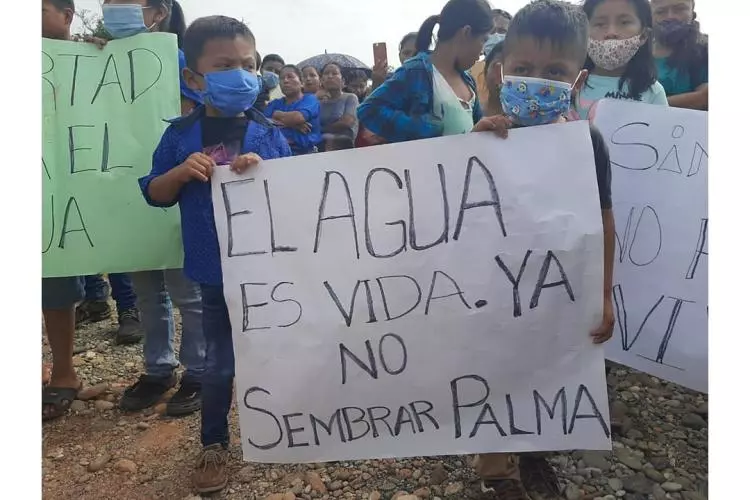
This article was originally published by World Rainforest Movement as “Certification schemes on “sustainability”: 30 years of deceit and violence” on 25 March, 2023 and was republished with permission alongside other reports from World Health Organisation, Global Witness and others. Read original.
ENDS
Read more about human rights abuses and greenwashing associated with “sustainable” palm oil
Contribute in five ways
1. Join the #Boycott4Wildlife on social media and subscribe to stay in the loop: Share posts from this website to your own network on Twitter, Mastadon, Instagram, Facebook and Youtube using the hashtags #Boycottpalmoil #Boycott4Wildlife.
2. Contribute stories: Academics, conservationists, scientists, indigenous rights advocates and animal rights advocates working to expose the corruption of the palm oil industry or to save animals can contribute stories to the website.
3. Supermarket sleuthing: Next time you’re in the supermarket, take photos of products containing palm oil. Share these to social media along with the hashtags to call out the greenwashing and ecocide of the brands who use palm oil. You can also take photos of palm oil free products and congratulate brands when they go palm oil free.
4. Take to the streets: Get in touch with Palm Oil Detectives to find out more.
5. Donate: Make a one-off or monthly donation to Palm Oil Detectives as a way of saying thank you and to help pay for ongoing running costs of the website and social media campaigns. Donate here

